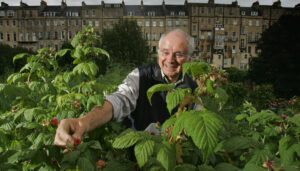I spent the first week of January in the parish of Weston Longville, Norfolk, in the company of the Revd James Woodforde. The year is 1776, or 1784, or 1801. No matter. The year is not important, because each year unfolds just as the last one did. The hearth in Woodforde’s study will still be “smoaking”, despite his endless attempts to have it fixed. The servants will still be “pert and saucy”, the winter cold the worst there has ever been, and the summer drought intolerable. The hospitality will remain excellent: rabbit in onion sauce, boiled mutton, neck of pork with apple sauce, roast beef, apricot dumplings, plum pudding, and tartlets. At Christmas there will be mince pies in the parlour, and hulver (holly) branches at the windows. Port wine, rum, and home-brewed beer flow freely all the year round.
James Woodforde began his diary on 24 July 1759, the day that he was made a scholar of New College, Oxford. He kept it up until 17 October 1802. He was 19 when he started and 63 when he finally put down his pen. He filled more than 60 volumes with terse observations about his life and the small world around him. You can read selections from these volumes today in various editions, all published under the title The Diary of a Country Parson. Woodforde thought his diary “trifling”. We should be thankful for such trifles today. The Rector of Weston recorded the sights, sounds, tastes, hopes, fears, and irritations of a sunken England.
The diary is more than a historical document. It is one of the most compelling books I have ever read. This is odd, since Woodforde led a sedate life. Born in Somerset in 1740, he went to Winchester and Oxford. He was a curate in the West Country as a young man, before securing the plum living of Weston Longville in 1774, where he lived a bachelor’s life with his niece, Nancy. He died on New Year’s Day 1803. And that was it. The most common line in the diary is “We breakfasted, dined &c. again at home”. Nothing much happens, yet I couldn’t wait to find out what wasn’t going to happen next.
There was little incident, but much to write about. Weather was important. For Woodforde, weather was not something that happened outside. The Norfolk cold was especially given to waltzing in and making itself at home. February 1785 was bad: “the Frost severer than ever in the night as it even froze the Chamber Pots under the Beds” — though December 1798 was worse: “Frost last Night & this Morning & all the Day intense. It froze in every part of the House even in the Kitchen. Milk & Cream tho’ kept in the Kitchen all froze. Meat like blocks of Wood… So severe Weather I think I never felt before.”
Woodforde’s religion was like the frost: an obvious and unexceptional part of life. If the parson had a rich spiritual existence, he did not record it in the diary. But he attended to his duties with vigour; the pages are full of burials, marriages and Christenings. When the Sunday congregation looked a little sparse, he was at pains to point out that poor weather had prevented many eager parishioners from attending. He made charitable donations and noted down prayers for the recently deceased. Other clergymen in the neighbourhood provided company, and entertained one another with a busy round of weekly dinners.
These dinners and suppers are the first thing a casual reader will notice. Woodforde took a Hobbitish pleasure in recording the fare, an endless procession of meats and desserts designed to honour guests as well as feed them. But it is the booze that makes the greatest impression. Port wine was the tipple of choice, and Woodforde brewed his own beer and mead. Helpful smugglers would augment the parsonage cellar with tubs of rum and gin. There is nothing to suggest that Woodforde drank any more than his contemporaries. His servants were often pissed, and drunken accidents were common. The parson was aware that it was possible to drink too much — he was constantly receiving news that his brother John had, yet again, fallen off his horse in the dead of night. In 1790 he mused that: “I drank but very little Wine Yesterday or to day only 2 or 3 glasses. I used myself before and all last Winter to near a Pint of Port Wine every Day and I now believe did me much harm.” Still, 40 pages later we find the entry: “Busy this morning in bottling off Moonshine.”
Weather, religion, food and wine. These run throughout the diary, and are interesting in themselves. But the real joy of the book comes from the accumulation of tiny details. The names: Tom Cushion, William Crotch, Lady Bacon, Bretingham Scurl, Garthon Spincks. The parson’s quest to dredge and stock the “great Pond” in his garden, and his worry that the turnips will freeze in the fields unless a good snowfall comes soon. The difficulties he had in managing his household, where pregnant maids and drunken boys caused frequent problems. His niece’s complaints about the dreariness of rural Norfolk and his nephew’s dreams of going to sea. The trauma of a botched tooth extraction, the use of a black cat’s tail to cure an inflamed eyelid, and the building torment of gout. A whole world is born from years of tight observation.
Writers are fascinated by Woodforde. They always ask the same question: why did he bother? “What made him keep it?” asked Ronald Blythe. Virginia Woolf conceded that “for whom he wrote or why he wrote it is impossible to say”. Woodforde might well have agreed. It is clear that the diary began as a simple record of expenditure and, to a lesser degree, personal achievement. Then the channel burst its banks and widened into broad waters. Everything is written as if it were an accounting of the day’s expenditure. This may, in part, explain Woodforde’s quiet success in the 20th century. His private, laconic prose has come of age. Modern writers strain for effects that the parson conjured artlessly in his smoky study.
We are all accidental diarists now. Even if we do not post about the minutiae of our daily lives online, phones and bank cards record much of our activity on any given day. When I put Woodforde down last night, I felt a sense of unease. His life, a life that could be led fully and quietly, is increasingly remote. It is unnerving to be confronted by the loss of so many little things. Not that the parson’s life was perfect. He was often melancholy, especially in his last years, when his family and closest friends began to die and increasing sickness left him a near-invalid. The growing threat of a French invasion filled him with anxiety. Even when he was a young man, there was “a bad boil upon my Posteriors” for every delicious meal enjoyed. And yet I cannot help but wonder what we have given up in exchange for our current world. As Woodforde once wrote: “The present times seem to prognosticate e’er long very alarming circumstances.”
Disclaimer
Some of the posts we share are controversial and we do not necessarily agree with them in the whole extend. Sometimes we agree with the content or part of it but we do not agree with the narration or language. Nevertheless we find them somehow interesting, valuable and/or informative or we share them, because we strongly believe in freedom of speech, free press and journalism. We strongly encourage you to have a critical approach to all the content, do your own research and analysis to build your own opinion.
We would be glad to have your feedback.
Source: UnHerd Read the original article here: https://unherd.com/



